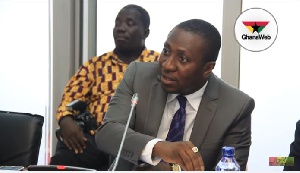The New Patriotic Party(NPP) Member of Parliament for Effutu, Afenyo Markin says despite charges of causing financial loss to the state, former Chief Executive Officer of the Ghana Cocoa Board(COCOBOD), Dr. Stephen Kwabena Opuni’s seeming harassment on his Bank Accounts by the Economic and Organized Crime Office is unjustified under the law.
According to the Effutu Legislator, the anti-graft agency[EOCO] must prove that all the bank accounts of the immediate past CEO of COCOBOD which it had laid hold on had been tainted by any proceeds of crime for which reason it has set a legal warfare to freeze pending his trial at the Supreme court.
After months of having his bank accounts under the control of EOCO, Dr Opuni’s lawyers obtained a High Court order on April 23, 2018, for the accounts to be frozen.
But the defense team could not sustain that judgment, as EOCO filed an ex-parte motion the following day, April 24, 2018, and obtained another order from the same court for the accounts to be frozen again.
Embattled Opuni filed another application at the same High Court seeking to get access to his accounts.
Commenting on the fall out from the Bank Accounts warfare between the two parties on Anopa Kasapa on Kasapa 102.5 FM Thursday, Mr. Afenyo Markin said for the mere fact that the defendant is being tried in court doesn’t suffice the need for EOCO to continue the path of capturing various Accounts that belong to Dr. Opuni instead of a specific suspicious account.
“I am not condemning EOCO. Supreme Court has ruled that if you freeze a person’s account for more than a year, there is no law that allows for the account to be frozen beyond that period, especially where there is an ongoing investigation. If for more than one year there hasn’t been any indictment against the person, the court must defreeze the account.
“In Opuni’s case, is it the case that EOCO has frozen his accounts for more than a year? If that is the case, then the situation will be different. If again, all the Accounts of Opuni have been frozen, and that all of it is the subject matter of a criminal trial, then, in that case, EOCO can apply for extension of the freezing order under section 40. But if some of the Accounts are part of the trial and some of the Accounts are not part of a trial, then by the position of the law if those accounts in question are not part of the trial, then you cannot freeze.
“Even recently, the supreme court made another pronouncement on whether or not when a person is undergoing trial and the freezing order has exceeded one year, the court can continue to hold that account. The court said No! because there was a case where SIC had frozen the Account of a person and the person was being tried at the criminal court and the financial court said that look, because of the trial the court could not defreeze the account although the one year has elapsed. Then the applicant felt aggrieved and went to the Supreme court for certiorari to quash the Orders extending the freezing orders. The court upheld the applicant's argument that looks under Section 23(a) of the Amended Act, Act 874, the freezing can only last for a year. And so whether or not there’s a trial does not suffice. But the Supreme court was quick in positing that perhaps there is a need for law reform. So it means that SC itself acknowledged that there is a limitation in the law, where authorities cannot exceed their mandate by saying that this is what the limitation is but if you want further powers perhaps go back to parliament for amendment. But as it is, you cannot say that there is trial ongoing so you’re going to extend. The court extending the freezing orders will not have the jurisdiction, because every court must be clothed with jurisdiction before it can sit on such application. So the Supreme court granted that relief that look, the freezing cannot be extended in the light of the limitation under Section 23(a) of the Act 874; so the court quickly acknowledged that there should be reform.
“So if you come to under Article 18 of the Constitution where Property Right is well written in our constitution, the courts are also careful that they don’t want to give any state institution the power to unduly interfere. The court is saying that you can only do that when you have evidence of a criminal conduct that the person has committed a crime. But you cannot merely interfere on somebody’s right to own property on mere whimsical suspicion, No!
“So I agree that if there is a particular allegation, which is a subject matter of a trial, then in that case that particular amount, so for instance in the case of Opuni, if there is an amount which is part of a charge sheet, then the state wants to preserve those funds through a freezing order, of course it’ll be within the mandate of the state to prevent dissipation of such fund by saying let’s freeze. But the argument I’m making here is that the Supreme Court has ruled that you cannot say that you are applying the principle of a poisoned tree; that the tree is poisoned, therefore, every fruit thereof is poisoned. Deal with the particular aspect which is poisoned. That is the position of the law, at least in the James Awuni case, Xenon Investment case, that I know of and also in the Woyome case at the court of Appeal.”
General News of Friday, 18 May 2018
Source: kasapafmonline.com

















